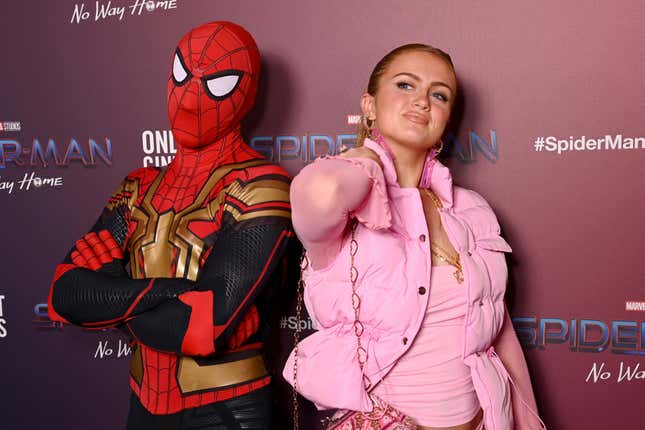‘Spider-Man: No Way Home’ Is the Antidote to the Superhero Genre’s Copaganda Problem
Few movies have been as intentional as this one in espousing some model of restorative justice.
EntertainmentMovies

WARNING: This article contains spoilers for Spider-Man: No Way Home.
As they await an impending attack from every supervillain in the Spiderverse, Tom Holland and Andrew Garfield’s Spider-Men are crouching on some scaffolding surrounding the Statue of Liberty, mesmerized by Tobey Maguire’s version of them and his ability to shoot webs directly from his wrists without the chemically engineered web-shooters that Holland and Garfield had to rely on. “Is it just your wrists?” they ask Maguire’s Peter Parker, of his natural web-shooting powers. “Or, you know…?”
It’s beats like this, teeming with comedy, nostalgic fan-service, and child-like wonder, that ground Marvel’s Spider-Man: No Way Home in much-needed lightness and relief between emotional devastation and edge-of-your-seat action sequences. The Jon Watts-directed, crown jewel of the Spiderverse has been widely compared to Avengers: Infinity War and Endgame in its ambition and—for lack of better words—epicness. But No Way Home’s greatness expands beyond its vast world-building and high-flying fight scenes and actually lies in the new ground the movie breaks for the superhero genre at a time of growing wariness that it’s all just an extension of copaganda. (The Captain America trilogy’s close marriage to the US military, Batman’s literal partnership with the Gotham PD, and Superman’s origins in war-time propaganda, are just a few shining examples of this.)
The conclusion to Holland’s Homecoming trilogy presents a new type of hero movie altogether, in which villains aren’t inherently villains, and superheroes like Holland and the Spider-Men who later back him up aren’t simply law-abiding, law-enforcing demigods. It’s not exactly new for superhero movies to portray sympathetic villains or off-beat heroes, but few movies seem as intentional as No Way Home in presenting some model of restorative justice and compassion as the superior alternatives to the harsh law-and-disorder regimens of nearly every other hero movie.
-

-

-

-

-

-

-

-

-

-

-

-

-

-

-

-

-

-

-

-

-

-

-

-

-

-

-

-

-

-

-

-

-

-

-

-

-

-

-

-








































